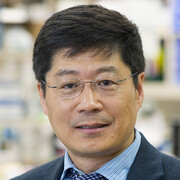Events
Apr 30, 2024
Seminar (2024-04-30)
School of Biomedical Sciences cordially invites you to join the following seminar:
Date: 30 April 2024 (Tuesday)
Time: 4:00 pm – 5:00 pm
Venue: Lecture Theatre 3 and 4, G/F, William M.W. Mong Block, 21 Sassoon Road
Speaker: Professor Guojun Bu, Lo Ka Chung Charitable Foundation Professor of Science and Chair Professor, Division of Life Science, The Hong Kong University of Science and Technology
Talk Title: Pathobiology of apoE in aging and Alzheimer’s disease
Biography

Prof. Guojun Bu is currently the Lo Ka Chung Charitable Foundation Professor of Science and a Chair Professor in the Division of Life Science at the Hong Kong University of Science and Technology. Prof. Bu received his PhD degree in Biochemistry from Virginia Tech and completed his postdoctoral training at the Washington University School of Medicine in St. Louis with a focus in cell biology and neuroscience. His previous career appointments include the Chair of the Department of Neuroscience and a named professor at Mayo Clinic, the Chief Scientific Officer of SciNeuro Pharmaceuticals, and a Professor of Cell Biology and Neuroscience at the Washington University in St. Louis.
Prof. Bu is a world leader in the field of apoE and apoE receptors, which play critical roles in the pathogenesis of Alzheimer’s disease and related dementias. He has published >350 high impact articles with an H-index of 115, i10-index of 302, and ~40,000 citations (Google Scholar). He has been a “Highly Cited Researcher” according to Web of Science for the past several years. Prof. Bu has received numerous honors and awards including the Zenith Fellows Award from the Alzheimer’s Association, the Established Investigator Award from the American Heart Association, a MERIT award from NIH, the Investigator of the Year award from the Mayo Clinic, and the MetLife Foundation Award for Medical Research in Alzheimer’s disease. He is an elected Fellow of the American Association for the Advancement of Science (AAAS), Founding Editor and Editor-in-Chief of Molecular Neurodegeneration, an Associate Editor for Science Advances, and is on the editorial board for Neuron.
Abstract
Alzheimer’s disease (AD) is the leading cause of dementia in elderly, impacting an increasingly large population of our aging society. Despite progress in understanding the pathological events associated with AD, the complex molecular events that underlie the development of AD remain poorly understood and are the key to developing targeted therapies. The ε4 allele of the apolipoprotein E (APOE) gene is the strongest genetic risk factor for late-onset AD compared to the common ε3 allele or the protective ε2 allele. In the central nervous system (CNS), apoE4 inhibits the clearance and promotes the aggregation of amyloid-β (Aβ) and has several Aβ-independent effects including age-dependent inferior functions in transporting lipids, supporting synapses, and controlling neuroinflammation. In this seminar, I will discuss our current understanding on how APOE impacts AD risk with a focus on our own studies using animal models and iPSC-derived cellular and organoid models. Specifically, using human APOE allele-specific and cell type-specific mouse models, we found that apoE isoforms expressed in different cell types in the brain, vasculature, and periphery differentially modulate brain cognition and AD pathology. Highlights will include the effects of peripheral apoE and microglial apoE in brain function and AD pathogenesis in an isoform-dependent manner. Knowledge gained through studies from our group and others can help with designing individualized therapies targeting APOE in a genotype-specific manner.
ALL ARE WELCOME
Should you have any enquiries, please feel free to contact Miss Crystal Chan at 3917 6830.

